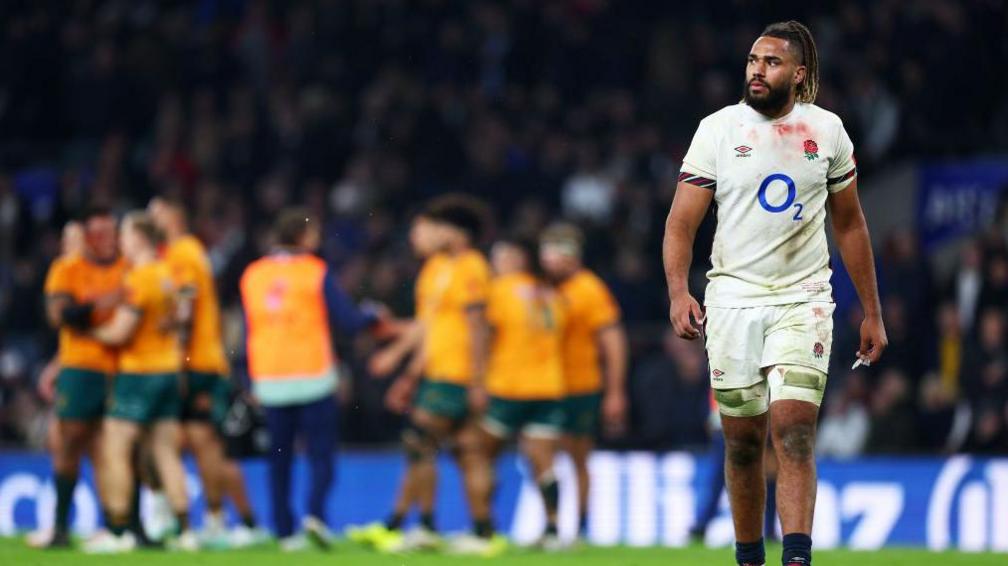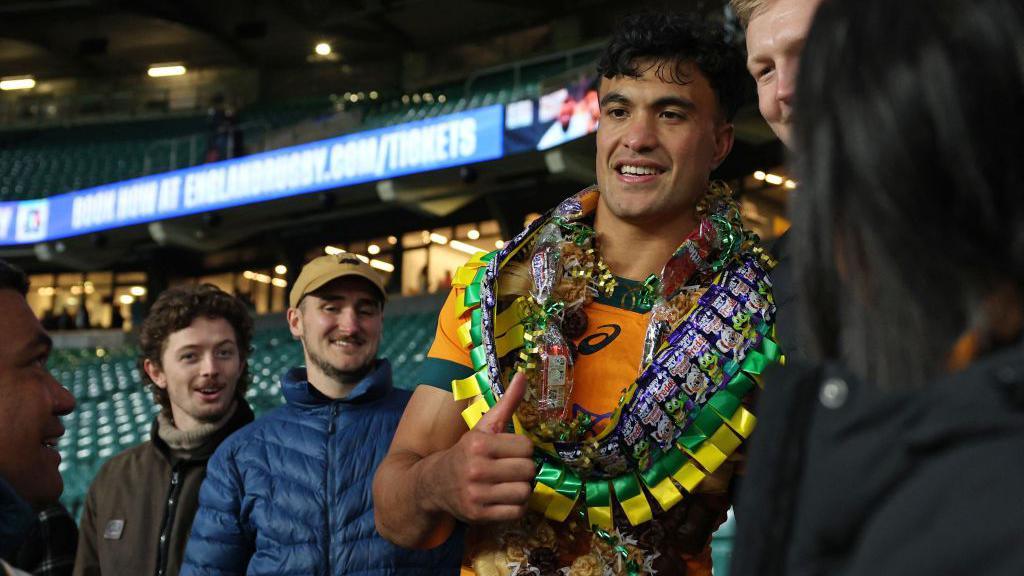'A fireworks display of frailties' - England exposed in agonising loss

Chandler Cunningham-South's two tries in the first quarter were wiped out by Australia's comeback
- Published
It is easy to imagine, somewhere in a Parisian hotel room, Eddie Jones chuckling at the television.
With his Japan side not playing France until the evening, he would have had just enough time to take in England's defeat by his native Australia.
And, if not a repeat, the 64-year-old might have picked up on some recycled storylines.
Five years ago, during his own time in charge at Twickenham, England astonishingly squandered a 31-0 lead against Scotland, ultimately squeaking a 38-38 draw.
A grim-faced Jones said afterwards that losing had become a habit. He thought the prospect of victory triggered jitters that put it back out of his team's reach.
"It is a recurring thing," he said.
"It's like we have some hand grenades in the back of a jeep and sometimes they go off when there's a lot of pressure."
It seems there are still some bouncing about in the boot.
And against Australia on Saturday, there was a whole fireworks display of frailties.
England contrived to win the match twice over and then, with the clock deep in the red, lost it again on a fatal, final play. They had led by 12 points in the first quarter, and were ahead with two minutes to play and a kick-off to come their way.
But, once again, the game squirmed free of their grasp as Len Ikitau got away from Ollie Sleightholme and Australia's replacement wing Max Jorgensen gleefully hared into the corner.
England have lost their last four matches by margins of five, two, seven and one point. Captain Jamie George has resisted Jones' old diagnosis, that their inability to see out matches is a psychological glitch.
But, until they grind through the pressure to victory, his team can't dispel the theory either.

Suaalii ended the match with a first Australia cap, the player of the match award and garlands from fans
There are plenty of impossible-to-deny problems to deal with first.
England's defence conceded five tries, as they were drawn into ding-dong high-tempo game that suited the opposition and that the half-time break couldn't halt.
At times, they were outmuscled on the gain line. At others, they were burned out wide.
Missed tackles around the fringes – where a defence should be most sturdy – cost them for tries by Harry Wilson and Jeremy Williams.
George had called for "bravery" earlier in the week. That strayed into recklessness when, leading by two points with five minutes left, England's needlessly elaborate first-phase play went awry and Andrew Kellaway scooped up and sprinted in.
England too scored five tries. The first was a beauty, passing through eight pairs of English hands in as many seconds to allow Chandler Cunningham-South in at the corner.
But there is a sense they rely on such off-the-cuff improvisation, rather than the methodical working over and opening up of opponents.
As England searched for a route back into the game in the second half, it was twin moments of Marcus Smith magic that showed the way.
Individuals given licence to roll out heads-up rugby and "play what you see" is good, but so are patterns, structures and plays that work in tandem to collectively tenderise and carve through a defence.
Joe Schmidt in the opposing coaches box is a master of them. Under him, Ireland played with more cunning, deception and trick set-pieces than a street magician.
England's playbook seems thin by comparison.
Australia beat England with last-gasp try
- Published9 November 2024
Unforgivable to concede 42 points at home - George
- Published9 November 2024
Schmidt's Australia are not at Ireland's level either. But they are slowly recovering their mojo after their pool-stage eviction from last year's Rugby World Cup.
Caught cold in the opening stages, they wrestled their way back into the contest before revelling in broken field.
Schmidt's big gamble of thrusting new rugby league recruit Joseph-Aukuso Suaalii into midfield for his first union game since his schooldays paid off handsomely.
The 21-year-old jigged across Twickenham's turf barefooted before the warm-ups, getting the size of the stage, and looked completely at home as he set up Tom Wright's try with the most delicious finger roll this side of a sushi platter.
It had been put to the Wallabies earlier this week that some people would like to see them win as evidence of their competitiveness before the British and Irish Lions' arrival in the summer.
Feeling understandably patronised, they shrugged off the suggestion.
Suaalii's debut, his midfield combination with Ikitau, Wright's scorching counter-attacks and Wilson's hard-hitting captain's performance showed that the Wallabies are not going to roll over in eight months' time.
Steve Borthwick's side, meanwhile, need their own injection of belief. A victory to flush out any neurosis and compound the belief in their plan.
Unfortunately South Africa are in town next. The only thing the reigning world champions and Rugby Championship holders are likely give their hosts are more questions to answer.
Jones, whose reign was ended by a defeat to Springboks two years ago, might be tempted to tune in once more.